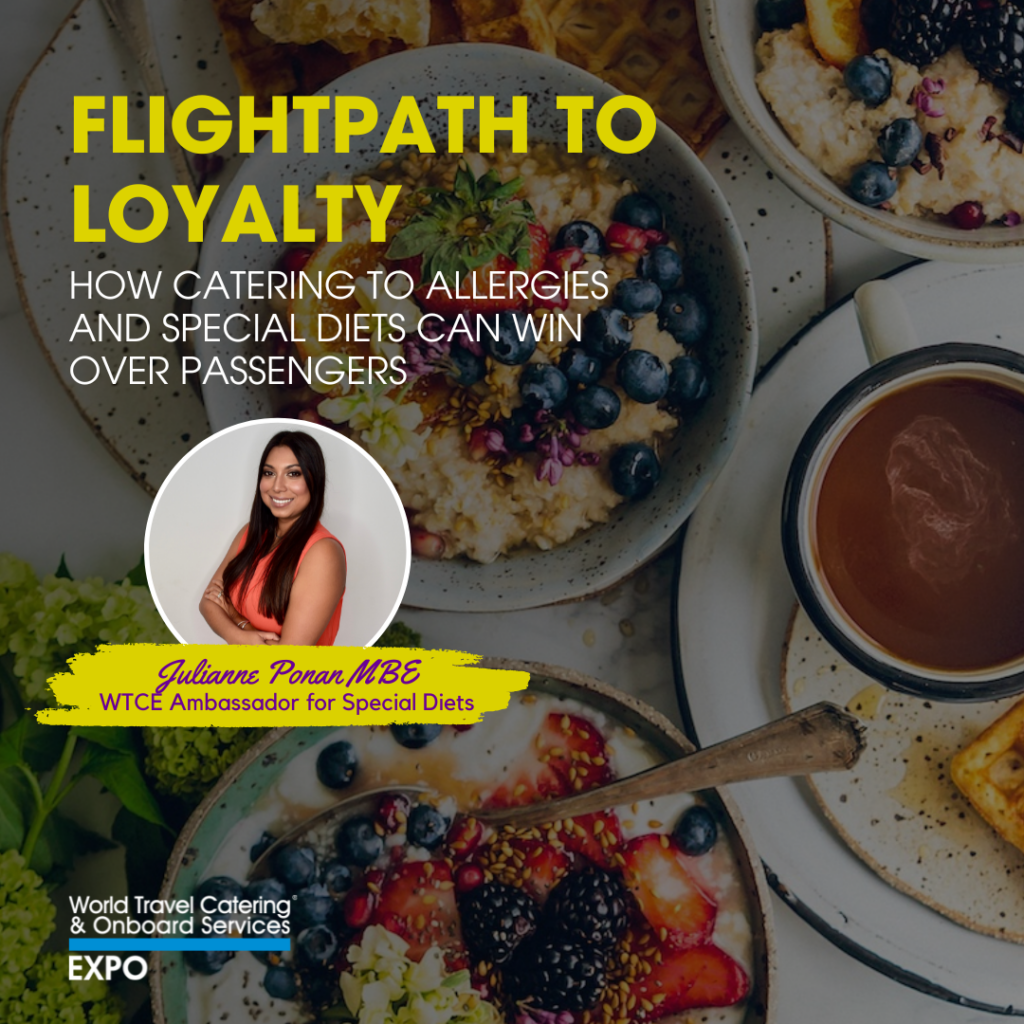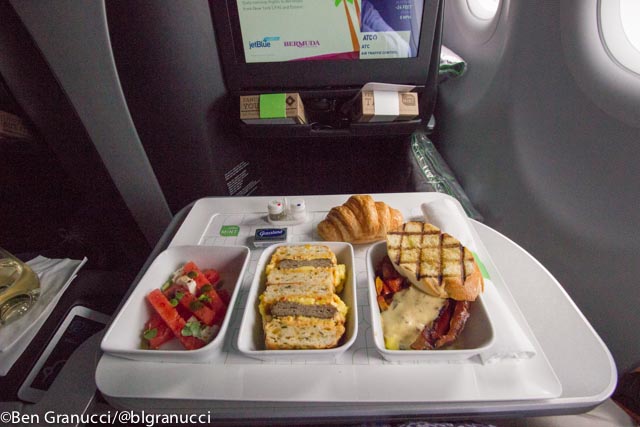
Securing a safe meal onboard shouldn’t really be a luxury—it should be your right, rather than a privilege. Free-from options aren’t merely preferences, they’re essential for those with food allergies.
Plane journeys can already evoke a mix of anticipation and worry for passengers; will I catch my flight? Is my luggage the correct weight? (Will the person sitting next to me be tolerable?) Yet, for me and many other passengers who have a food allergy, there’s an added layer of fear; the possibility of encountering allergens in my meal or onboard snacks that could trigger a life-threatening reaction mid-flight.
This is the exact reason why accommodating for passengers with allergies will foster loyalty.
Should airlines care more about allergies and special diets?
With two children in every class of 30 affected by food allergies, the likelihood is high that every flight hosts passengers with a range of allergen sensitivities. The amount of people being diagnosed with allergies has grown year on year, with food allergies now affecting 220million globally.
Audrey Hart Senior Manager – F&B and Ancillaries, Inflight Services at Virgin Atlantic agrees, commenting, “Most certainly. Every customer wants to feel that their individual needs matter.
They want to feel safe and cared for. When an airline can proactively and consistently demonstrate its care towards all customers and their individual needs, the appreciation is reciprocated and loyalty builds.”
Does ‘loyalty’ exist when you cater for people with allergies?
As per the recent survey conducted by CFAAR (The Center for Food Allergy & Asthma Research) and Leanne Mandelbaum with 4,700 people, 75% of individuals expressed a strong willingness to choose the same airline again, if their needs are met, proving the allergy consumer stays loyal.
Each airline aims to enhance loyalty through their frequent flyer programs, but how can loyalty be won from a customer satisfaction perspective? By making minor adjustments to ensure inclusivity in the food served, or implementing pre-boarding procedures for passengers with severe allergies, airlines can directly impact where a passenger with allergies chooses them again.
While some airlines provide excellent services for passengers with allergies, they may not effectively communicate this and as a result, passengers often find it confusing and challenging to locate allergy policies on the airline’s website. By improving clarity for passengers, airlines can tap into the rapidly expanding market of allergy-conscious travellers.
Iberia Air is one of the airlines already taking big steps. Melanie Berry, Director of Customer Experience at Iberia said, “we are a peanut free airline and all our menu cards for both complimentary and buy on board food detail the allergens. Our crew also have the ingredients list if customers need to have more specific detail.
On every flight we also carry EpiPens in our doctors’ kits – if the customer has advised us in advance of any allergies the crew will ask the customer if they are carrying their own EpiPen and will also do a special announcement to advise customers that we have a customer onboard travelling today with a severe allergy.”
Audrey Hart also adds the steps Virgin Atlantic has already actively put in place to make their flights more inclusive, “Once onboard, customers can liaise with our crew should there be a need for a peanut allergy passenger announcement to be made, or to get hold of our allergens reference guides loaded upon all our flights from the UK and US.
At meal times, our customers can ensure first and secondary meal services meeting their dietary requirements. And in between services customers in our upper class and premium cabins can enjoy an inclusive range of snacks including 14 allergen free sweet and savoury options from Creative Nature.”
These measures empower passengers to opt for specific airlines. Allergies are not a matter of choice, and those affected tend to be exceptionally loyal consumers. Their priority is to travel safely from point A to point B while still enjoying quality food that tastes great.
The difficulties faced when catering for special meals?
Melanie Berry says, “Special meals are very complicated so in reality we may never be able to offer specific children’s meals for every type of dietary requirement.”
The other issue is there is no specific ‘allergen free meal’. Melanie explains that “We categorise special meals into 3 groups – Religious, Medical and Lifestyle choice special meals. There is no specific allergen free meal in the current list of special meals, which given the changing trend is something that has to change quickly”. So, whilst non-life-threatening dietary choices are being catered for, life-threatening dietary needs tend not to be.

Why not plan the menu with simple swaps to focus on inclusive catering?
This is a big one really. If you could swap out sesame oil or peanut oil for a vegetable oil that would make the product suitable for all, why wouldn’t you? Removing an allergen could be a big step towards better options on board. Unfortunately, that’s only the first step in creating safer options, as the risk of cross contamination is still scary for those with severe allergies.
The snack offerings for premium and complimentary should be challenged to be as inclusive as possible, enabling as many passengers as possible to enjoy. Through economies of scale, this would enable viable costs for high quality product that is truly inclusive, especially with smaller producers who can tailor their factories to remove allergies if the promise of an airline contract is there.
The upcoming trends!
At the moment, there is a big push towards functional food and drink, or healthier options for when you are up in the air. With that being said, many brands are packing their products full of nuts to tick the ‘healthier’ box. However, this doesn’t help people with allergies, or the airlines who can’t serve nuts whilst an allergy sufferer is on board (losing revenue for buy on board and leaving passengers upset they can’t snack).
I asked Melissa Adamski, who is an accredited practising Travel Dietician, what she would suggest as a good alternative snack or accompaniment to a meal, so that flying wouldn’t feel like a death trap for nut allergy sufferers.
“While nuts are great, there are other foods which are also nutritious, and delicious, which can be used as alternatives to nuts while flying. Olives, pumpkin seeds, sunflower seeds, roasted corn, fava beans, avocado, and chia seeds are some fabulous whole foods which can be used as snacks or in meals to pack a similar nutrition punch.
However, be careful with may contain statements – some seeds and other snacks may be processed in the presence of nuts.”
Melanie Berry said, “The trend for special meals is increasing in general as customers become more aware and more health conscious and of course as allergies increase. Meeting customers’ expectations with special meals is difficult as they are very complex, and we can never guarantee that the meals are allergen free.
Audrey Hart also agreed and said that, “Special meals consumption trends are growing. This is due to a blend of more food intolerances and allergies as well as an increased awareness for wellness / nutrition / gut health. We are seeing a significant increase of requests for multiple special meal types. Such as vegan and gluten intolerance, or lactose free and low sugar etc. The combinations are endless. We review our special meal types selection annually to monitor and incorporate key trends where possible within the significant limitations of our complex environment.”
Clearly, there are discernible market trends indicating increased customer demand for improved special meal/snack options during air travel. However, there remains a need to address concerns regarding cross-contamination, showcasing the importance of incorporating pre-packaged to be truly inclusive products
This article in 2023 showcased some of the trends with easyJet also banning all nuts on board.
Why having a backup option is so important to increase customer loyalty
Though seemingly simple, executing it effectively can yield significant results. Virgin Atlantic exemplifies this with their ‘surprise and delight’ approach. In instances where I can’t partake in a full meal during a flight, the crew often surprises me with a small, pre-packaged snack from their reserve. This gesture goes a long way in making passengers feel valued and appreciated.
Several other airlines also offer delightful surprises for their passengers. For instance, SWISS Air celebrates birthdays or special occasions by gifting passengers a charming chocolate in the shape of a plane. However, it would be even more wonderful if they included options for passengers with special dietary requirements, specifically milk or soya free when it comes to chocolate.
Its not all about food! What about the amenities?
There are many ways in which to enhance customer satisfaction, particularly in premium, business, and first-class services—think those luxurious amenity kits we all adore. Some airlines go the extra mile with branded salt and pepper shakers saying ‘property of’ on them, recognising their value even after leaving the plane as a clever marketing tactic to stay top-of-mind with their passengers.
For individuals with nut allergies, the issue extends beyond food, to include cosmetics. The lavish offerings in business and first-class, from soothing body lotions to plush eye masks, could pose a serious risk if they contain almond or hazelnut oil.
Perhaps airlines could prioritise procuring more inclusive products, considering the needs of passengers throughout the entire journey from start to finish.
Looking ahead
To learn more about how to increase your passenger loyalty through special meals/offering on board, come to the Taste of Travel session on Wednesday 29th May at 12-12.45pm where Audrey Hart, Melanie Berry, Simone Walli and I will address the potential link between accommodating allergies and fostering customer loyalty, backed by data-driven insights into the financial ramifications of mishaps in this area.
